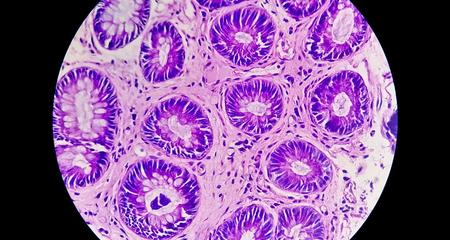Peritoneal carcinomatosis, or cancer that has spread widely to the abdominal cavity, can happen with colorectal, ovarian, appendix, bladder and other cancers. In the past, it was thought that once a person developed carcinomatosis, there were few treatment options and little hope. But that is changing.
Peritoneal Carcinomatosis Symptoms and Stages
Initially, symptoms may include abdominal discomfort, bloating, weight loss, loss of skeletal muscle mass (wasting), nausea and fatigue. As the condition advances, tumor tissue grows on the surface of the peritoneum — the thin protective membrane lining the peritoneal cavity.
The peritoneal cavity is the space between organs in your abdomen. Fluid accumulates within the abdomen, a condition known as ascites. Ascites can affect organs like the lungs and kidneys and can become incapacitating. There can also be signs of bowel obstruction like constipation, vomiting and loss of appetite.
Primary vs. Secondary Peritoneal Carcinomatosis
When peritoneal carcinomatosis is called primary, it means the cancer started in the peritoneum. For example, it can be due to peritoneal mesothelioma or primary peritoneal carcinoma.
Primary peritoneal carcinoma is not hereditary but people who have certain genetic mutations like BRCA1 and BRACA2, which increase the risk for ovarian cancer, can be at higher risk of developing primary peritoneal carcinoma. It is a rare disease.
Early symptoms can be vague or mimic other problems and often go undetected, resulting in diagnosis when the cancer is at an advanced stage. It is nearly always discovered at stage III or higher. Surgery is needed to diagnose and stage this cancer. Stage III primary peritoneal carcinoma is divided into three more stages.
- 3A: The cancer has spread to lymph nodes outside the peritoneum, or cancer cells have spread to the surface of the peritoneum outside the pelvis.
- 3B: The cancer has spread to the peritoneum outside the pelvis. The size of the cancer in the peritoneum is 2 centimeters (cm) or smaller. It may also have spread to lymph nodes outside the peritoneum.
- 3C: The cancer has spread to the peritoneum outside the pelvis. The size of the cancer in the peritoneum is larger than 2 cm. It may have spread to lymph nodes outside the peritoneum or to the surface of the liver or spleen.
In stage IV, primary peritoneal cancer has spread to other organs. This stage is further divided:
- 4A: Cancer cells are found in the fluid that builds up around the lungs.
- 4B: The cancer has spread to organs and tissues outside the abdomen such as lymph nodes in the liver, lungs or groin.
Secondary peritoneal carcinomatosis originates in another area of the body — like the appendix, colon, stomach, or ovaries — and spreads to the peritoneum. For example, around 15% to 20% of people with colorectal cancer develop metastases to the peritoneum. Secondary peritoneal carcinomatosis is more common than primary peritoneal cancer.
Staging is the same as for the primary site of the cancer. For instance, peritoneal carcinomatosis that spreads from the colon is considered stage IV colon cancer.
Cytoreductive Surgery and Hyperthermic Intraperitoneal Perfusion (HIPEC)
Data supports an aggressive surgical approach for colorectal cancer patients with carcinomatosis. The goal is to reduce the tumor burden in the abdominal cavity as much as possible through surgery; then, treat the abdominal cavity with hyperthermic or “hot” chemotherapy, also known as HIPEC. Heating the chemotherapy solution increases its effectiveness.
The procedure is done in the operating room and allows physicians to deliver much higher concentrations of chemotherapy to the abdominal cavity than through an IV, with less toxicity to the body. This combination of treatments can dramatically improve outcomes and survival rates for patients who previously had little hope of survival.
Virtual Visits Are Available
Safe and convenient virtual visits by video let you get the care you need via a mobile device, tablet or computer wherever you are. We’ll gather your medical records for you and get our experts’ input so we can offer treatment options without an in-person visit. To schedule a virtual visit, call 1-866-680-0505.
Recognized as High Performing by U.S. News & World Report
Froedtert Hospital is recognized by U.S. News & World Report as high performing in three adult specialties and 16 procedures and conditions, including cancer, colon cancer surgery and gastroenterology and GI surgery.More to Explore





